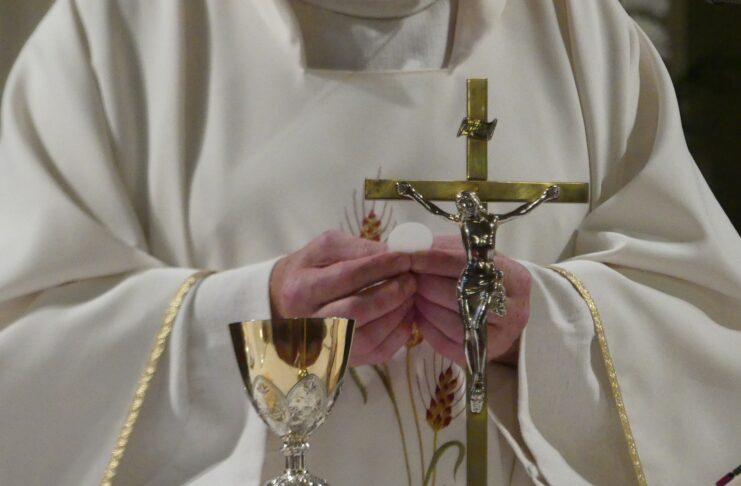Even as pro-abortion terrorist groups were vandalizing and firebombing Catholic churches and pro-life charities in the wake of a U.S. Supreme Court ruling allowing states to regulate abortion, the Federal Bureau of Investigation was targeting Catholics as possible terrorists.
Now a U.S. House Judiciary Committee investigation reveals the extent to which the FBI surveilled and planted spies in Catholic churches as part of a larger scheme to cast the pro-life movement as a terrorist threat.
The Committee's Select Subcommittee on the Weaponization of the Federal Government now reports a memorandum from the FBI's Richmond Field Office, sent to the entire Bureau, sought to portray traditional Catholics as a potential violent threat.
“Under the guise of tackling the threat of domestic terrorism, the memorandum painted so-called certain ‘radical-traditionalist Catholics' (RTCs) as violent extremists and proposed opportunities for the FBI to infiltrate Catholic churches as a form of ‘threat mitigation,'” the Committee reports.
At the same time, the FBI sought to portray Catholics as terrorists, a pro-abortion terrorist group calling itself “Jane's Revenge” was carrying out a nationwide campaign of vandalism and firebombings, aimed at Catholic churches and pro-life groups, with threats to escalate the violence.
“In February 2023, the Committee began its oversight after whistleblower Kyle Seraphin revealed the existence of the Richmond memorandum in internal FBI systems. In April 2023, after the FBI failed to fully cooperate with the oversight, Chairman Jordan issued a subpoena to Director Christopher Wray, requesting documents related to the memorandum,” the Committee reports.
“The Committee and Select Subcommittee's oversight shows that the FBI abused its counterterrorism tools to target Catholic Americans as potential domestic terrorists. The Committee and Select Subcommittee discovered that the FBI relied on at least one undercover agent to develop its assessment and the FBI even proposed developing sources among the Catholic clergy and church leadership,” the Committee notes.
“Not only did the FBI propose to develop sources, but it already interviewed a priest and choir director affiliated with a Catholic church in Richmond, Virginia for the memorandum. Most concerning of all, without the disclosure of the whistleblower, the Richmond memorandum would still be operative in FBI systems, violating the religious liberties of millions of Catholic Americans,” the Committee adds.
The Committee notes that “from witness testimony and FBI internal documents…there were errors at every step of the drafting, review, approval, and removal process of the memorandum,” writing that:
The documents received pursuant to the Committee's subpoena show there was no legitimate basis for the memorandum to insert federal law enforcement into Catholic houses of worship.
The basis for the Richmond memorandum relied on a single investigation in the Richmond Field Office's area of responsibility in which the subject “self-described” as a “radical-traditionalist Catholic” (RTC). However, FBI employees could not define the meaning of an RTC when preparing, editing, or reviewing the memorandum. Even so, this single investigation became the basis for an FBI-wide memorandum warning about the dangers of “radical” Catholics.
Whistleblower disclosures reveal that the FBI interviewed a priest and choir director affiliated with a Catholic church in Richmond, Virginia while preparing the memorandum to inform on the parishioner under investigation.
In addition to the investigation in Virginia, FBI Richmond relied on reporting from other field offices across the country, including FBI Los Angeles, FBI Milwaukee, and FBI Portland in making its assessment.
The two FBI employees who co-authored the memorandum later told FBI internal investigators that they knew the sources cited in the memorandum had a political bias—sources including the Southern Poverty Law Center, Salon, and The Atlantic.
The documents received pursuant to the Committee's subpoena show that the FBI singled out Americans who are pro-life, pro-family, and support the biological basis for sex and gender distinction as potential domestic terrorists. The memorandum recognized “the run-up to the next general election cycle” as a key time frame and cited the Dobbs v. Jackson Women's Health Organization decision that overturned Roe v. Wade as a flash point.
Without considerable criticism in the wake of the disclosure of the memorandum, the document would have remained in an FBI-wide system. At the time of the memorandum's disclosure, FBI officials were discussing turning the memorandum into an external, public-facing document highlighting the threats of “radical” Catholics. Most concerning, FBI Richmond still desires to convey this information to other field offices about “radical-traditionalist Catholics.”
FBI Richmond's senior leadership saw the memorandum as an opportunity to insert federal law enforcement into places of worship and support outreach efforts to the Diocese of Richmond and other Catholic parishes.
Following public criticism about the memorandum, FBI Richmond's Special Agent in Charge Stanley Meador met with members of the clergy, including the Most Reverend Barry Knestout, Bishop of the Diocese of Richmond, and a Cardinal of the Catholic Church to mend the FBI's relationship with the Catholic community.
Whistleblower disclosures to the Committee further reveal that the memorandum was accessible to other field offices across the country. However, the FBI still has no idea how many FBI employees accessed the memorandum before its removal and cannot confirm whether any outreach occurred to Catholic parishes as a result of the memorandum.
The opinions expressed in this article are those of the author and do not necessarily reflect the positions of American Liberty News.
READ NEXT: John Kerry Calls For Elimination Of Entire US Industry


